Marriott Hotel: Talent Management and Recruitment Strategies Analysis
VerifiedAdded on 2023/01/13
|10
|2058
|27
Report
AI Summary
This report examines talent management within the service industry, specifically focusing on the Marriott Hotel. It explores the evolution of recruitment strategies and their impact on talent management. The research aims to identify changes in recruitment methods, assess their influence on talent management, and pinpoint challenges arising from these changes. The methodology employs qualitative research, utilizing thematic analysis of data collected from HR managers at Marriott. The literature review covers changing recruitment trends, the impact of strategies on talent management, and challenges such as technological integration and security risks. The report also includes a timeline for the research process and references a range of academic sources, offering a comprehensive analysis of the topic.
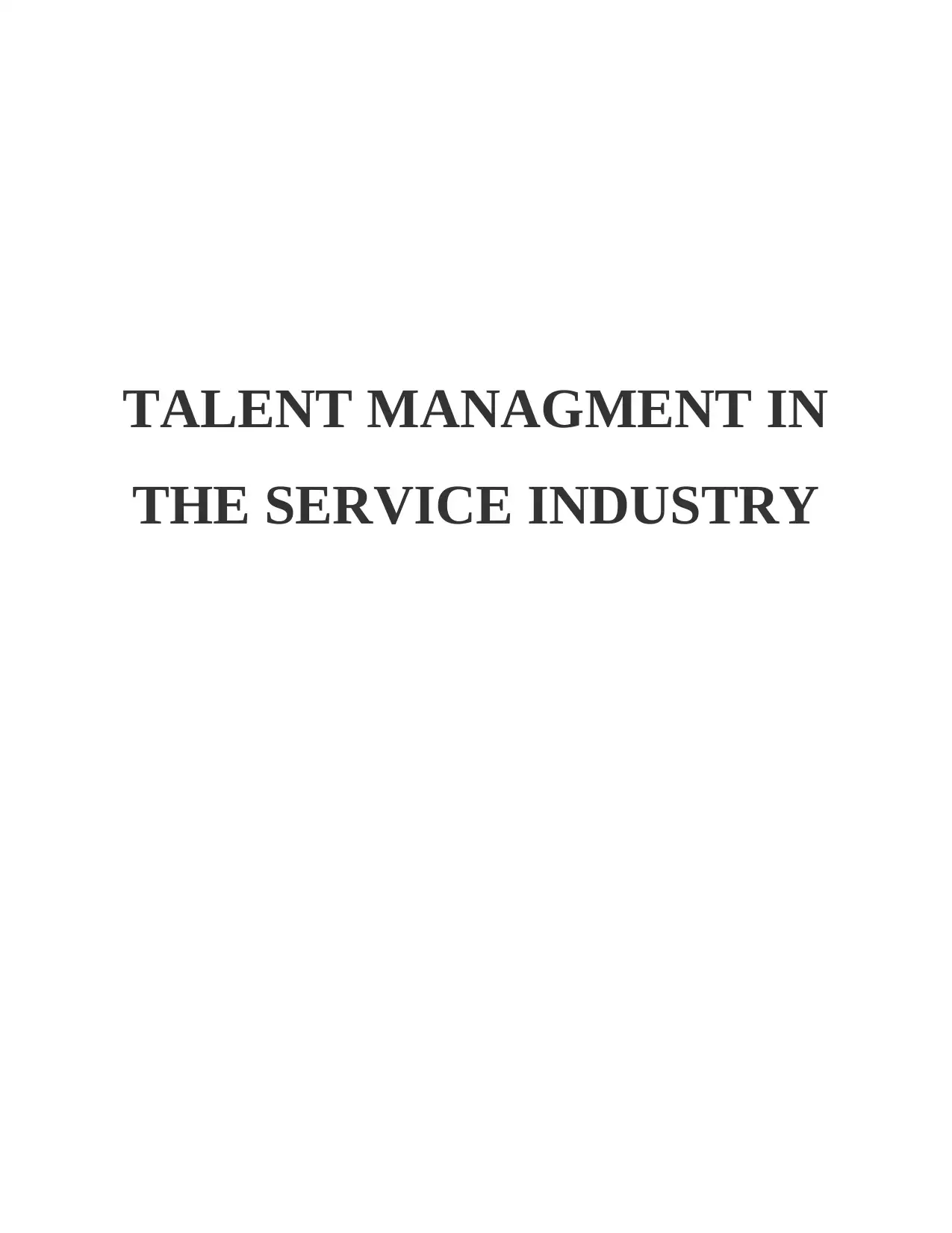
TALENT MANAGMENT IN
THE SERVICE INDUSTRY
THE SERVICE INDUSTRY
Paraphrase This Document
Need a fresh take? Get an instant paraphrase of this document with our AI Paraphraser
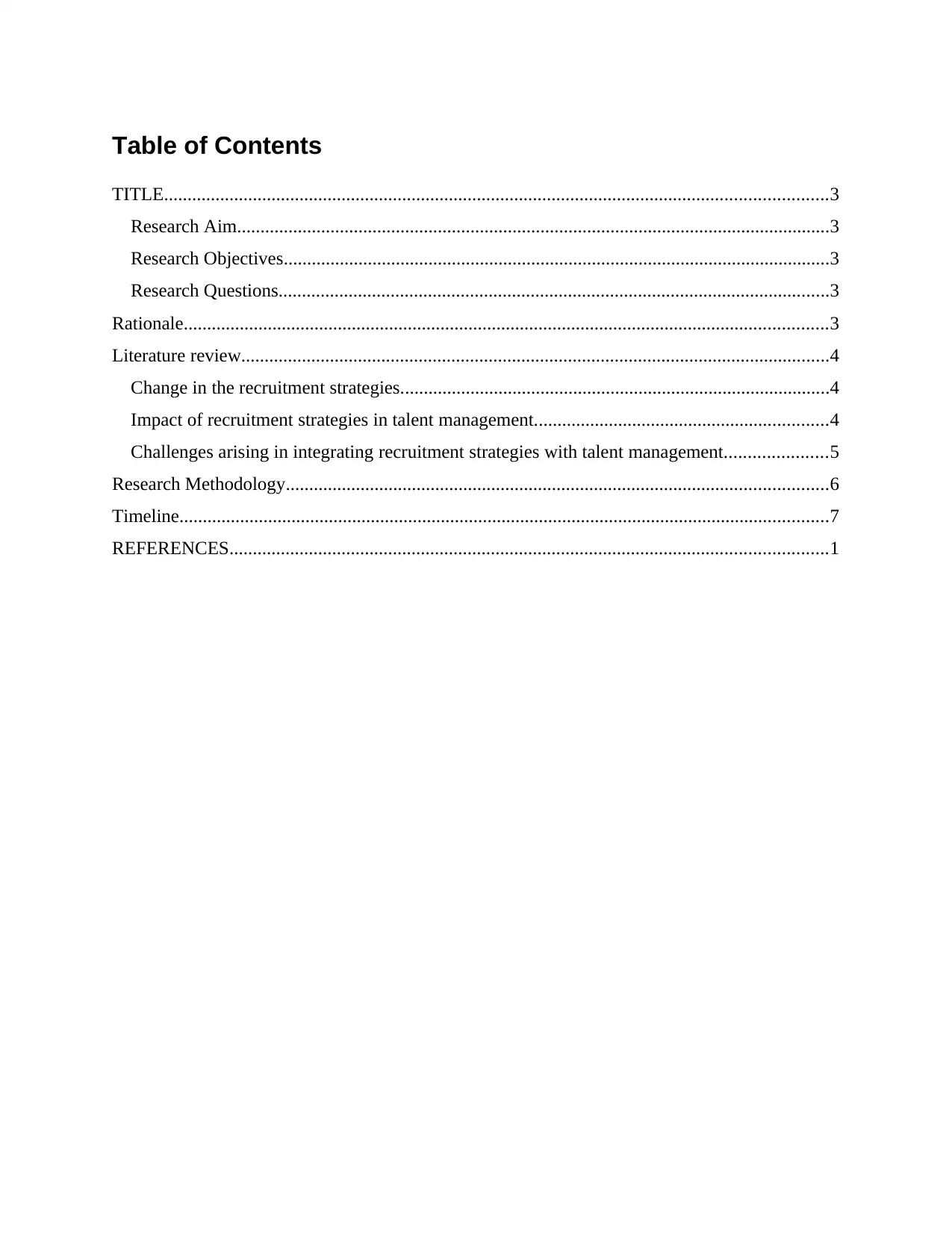
Table of Contents
TITLE..............................................................................................................................................3
Research Aim...............................................................................................................................3
Research Objectives.....................................................................................................................3
Research Questions......................................................................................................................3
Rationale..........................................................................................................................................3
Literature review..............................................................................................................................4
Change in the recruitment strategies............................................................................................4
Impact of recruitment strategies in talent management...............................................................4
Challenges arising in integrating recruitment strategies with talent management......................5
Research Methodology....................................................................................................................6
Timeline...........................................................................................................................................7
REFERENCES................................................................................................................................1
TITLE..............................................................................................................................................3
Research Aim...............................................................................................................................3
Research Objectives.....................................................................................................................3
Research Questions......................................................................................................................3
Rationale..........................................................................................................................................3
Literature review..............................................................................................................................4
Change in the recruitment strategies............................................................................................4
Impact of recruitment strategies in talent management...............................................................4
Challenges arising in integrating recruitment strategies with talent management......................5
Research Methodology....................................................................................................................6
Timeline...........................................................................................................................................7
REFERENCES................................................................................................................................1
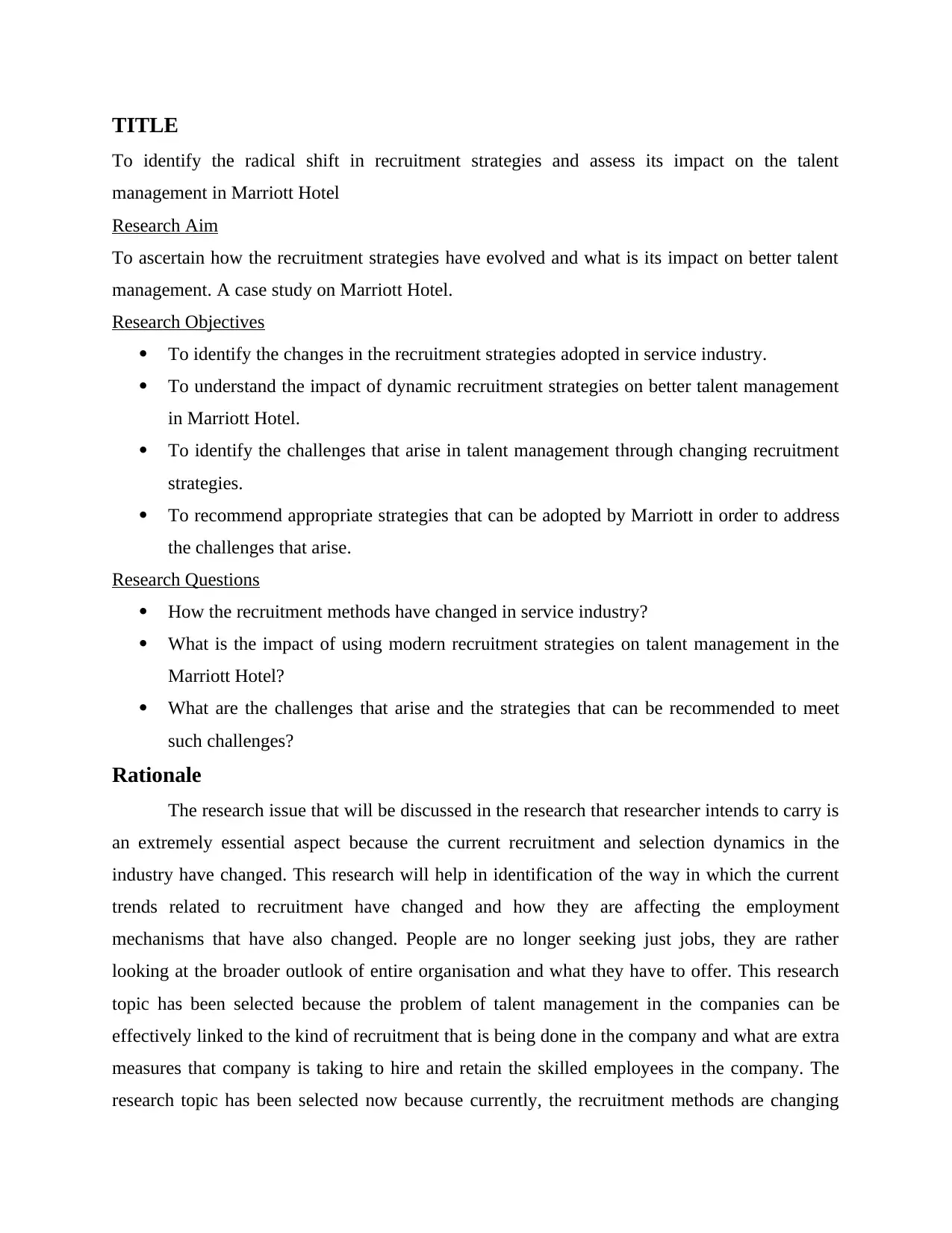
TITLE
To identify the radical shift in recruitment strategies and assess its impact on the talent
management in Marriott Hotel
Research Aim
To ascertain how the recruitment strategies have evolved and what is its impact on better talent
management. A case study on Marriott Hotel.
Research Objectives
To identify the changes in the recruitment strategies adopted in service industry.
To understand the impact of dynamic recruitment strategies on better talent management
in Marriott Hotel.
To identify the challenges that arise in talent management through changing recruitment
strategies.
To recommend appropriate strategies that can be adopted by Marriott in order to address
the challenges that arise.
Research Questions
How the recruitment methods have changed in service industry?
What is the impact of using modern recruitment strategies on talent management in the
Marriott Hotel?
What are the challenges that arise and the strategies that can be recommended to meet
such challenges?
Rationale
The research issue that will be discussed in the research that researcher intends to carry is
an extremely essential aspect because the current recruitment and selection dynamics in the
industry have changed. This research will help in identification of the way in which the current
trends related to recruitment have changed and how they are affecting the employment
mechanisms that have also changed. People are no longer seeking just jobs, they are rather
looking at the broader outlook of entire organisation and what they have to offer. This research
topic has been selected because the problem of talent management in the companies can be
effectively linked to the kind of recruitment that is being done in the company and what are extra
measures that company is taking to hire and retain the skilled employees in the company. The
research topic has been selected now because currently, the recruitment methods are changing
To identify the radical shift in recruitment strategies and assess its impact on the talent
management in Marriott Hotel
Research Aim
To ascertain how the recruitment strategies have evolved and what is its impact on better talent
management. A case study on Marriott Hotel.
Research Objectives
To identify the changes in the recruitment strategies adopted in service industry.
To understand the impact of dynamic recruitment strategies on better talent management
in Marriott Hotel.
To identify the challenges that arise in talent management through changing recruitment
strategies.
To recommend appropriate strategies that can be adopted by Marriott in order to address
the challenges that arise.
Research Questions
How the recruitment methods have changed in service industry?
What is the impact of using modern recruitment strategies on talent management in the
Marriott Hotel?
What are the challenges that arise and the strategies that can be recommended to meet
such challenges?
Rationale
The research issue that will be discussed in the research that researcher intends to carry is
an extremely essential aspect because the current recruitment and selection dynamics in the
industry have changed. This research will help in identification of the way in which the current
trends related to recruitment have changed and how they are affecting the employment
mechanisms that have also changed. People are no longer seeking just jobs, they are rather
looking at the broader outlook of entire organisation and what they have to offer. This research
topic has been selected because the problem of talent management in the companies can be
effectively linked to the kind of recruitment that is being done in the company and what are extra
measures that company is taking to hire and retain the skilled employees in the company. The
research topic has been selected now because currently, the recruitment methods are changing
⊘ This is a preview!⊘
Do you want full access?
Subscribe today to unlock all pages.

Trusted by 1+ million students worldwide
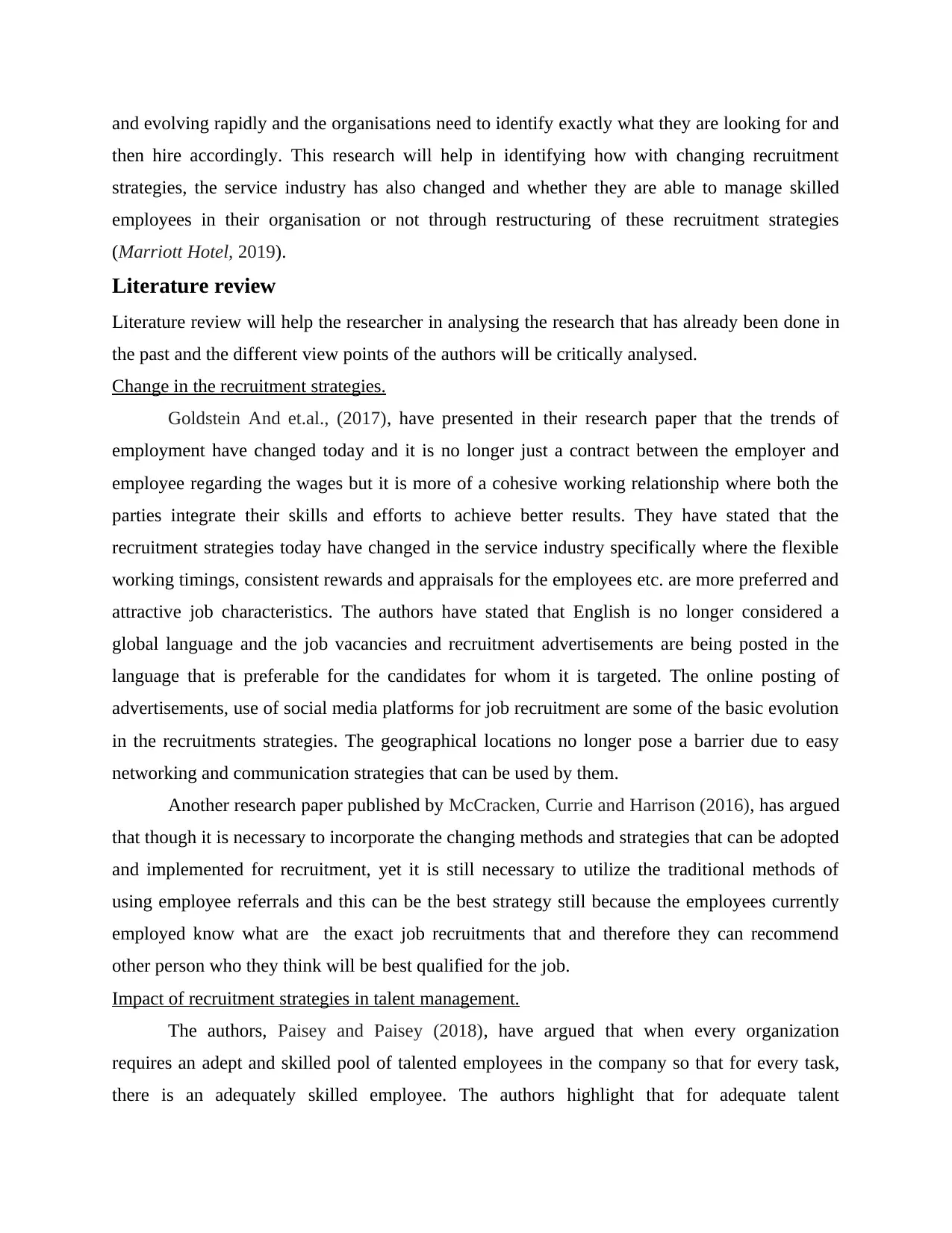
and evolving rapidly and the organisations need to identify exactly what they are looking for and
then hire accordingly. This research will help in identifying how with changing recruitment
strategies, the service industry has also changed and whether they are able to manage skilled
employees in their organisation or not through restructuring of these recruitment strategies
(Marriott Hotel, 2019).
Literature review
Literature review will help the researcher in analysing the research that has already been done in
the past and the different view points of the authors will be critically analysed.
Change in the recruitment strategies.
Goldstein And et.al., (2017), have presented in their research paper that the trends of
employment have changed today and it is no longer just a contract between the employer and
employee regarding the wages but it is more of a cohesive working relationship where both the
parties integrate their skills and efforts to achieve better results. They have stated that the
recruitment strategies today have changed in the service industry specifically where the flexible
working timings, consistent rewards and appraisals for the employees etc. are more preferred and
attractive job characteristics. The authors have stated that English is no longer considered a
global language and the job vacancies and recruitment advertisements are being posted in the
language that is preferable for the candidates for whom it is targeted. The online posting of
advertisements, use of social media platforms for job recruitment are some of the basic evolution
in the recruitments strategies. The geographical locations no longer pose a barrier due to easy
networking and communication strategies that can be used by them.
Another research paper published by McCracken, Currie and Harrison (2016), has argued
that though it is necessary to incorporate the changing methods and strategies that can be adopted
and implemented for recruitment, yet it is still necessary to utilize the traditional methods of
using employee referrals and this can be the best strategy still because the employees currently
employed know what are the exact job recruitments that and therefore they can recommend
other person who they think will be best qualified for the job.
Impact of recruitment strategies in talent management.
The authors, Paisey and Paisey (2018), have argued that when every organization
requires an adept and skilled pool of talented employees in the company so that for every task,
there is an adequately skilled employee. The authors highlight that for adequate talent
then hire accordingly. This research will help in identifying how with changing recruitment
strategies, the service industry has also changed and whether they are able to manage skilled
employees in their organisation or not through restructuring of these recruitment strategies
(Marriott Hotel, 2019).
Literature review
Literature review will help the researcher in analysing the research that has already been done in
the past and the different view points of the authors will be critically analysed.
Change in the recruitment strategies.
Goldstein And et.al., (2017), have presented in their research paper that the trends of
employment have changed today and it is no longer just a contract between the employer and
employee regarding the wages but it is more of a cohesive working relationship where both the
parties integrate their skills and efforts to achieve better results. They have stated that the
recruitment strategies today have changed in the service industry specifically where the flexible
working timings, consistent rewards and appraisals for the employees etc. are more preferred and
attractive job characteristics. The authors have stated that English is no longer considered a
global language and the job vacancies and recruitment advertisements are being posted in the
language that is preferable for the candidates for whom it is targeted. The online posting of
advertisements, use of social media platforms for job recruitment are some of the basic evolution
in the recruitments strategies. The geographical locations no longer pose a barrier due to easy
networking and communication strategies that can be used by them.
Another research paper published by McCracken, Currie and Harrison (2016), has argued
that though it is necessary to incorporate the changing methods and strategies that can be adopted
and implemented for recruitment, yet it is still necessary to utilize the traditional methods of
using employee referrals and this can be the best strategy still because the employees currently
employed know what are the exact job recruitments that and therefore they can recommend
other person who they think will be best qualified for the job.
Impact of recruitment strategies in talent management.
The authors, Paisey and Paisey (2018), have argued that when every organization
requires an adept and skilled pool of talented employees in the company so that for every task,
there is an adequately skilled employee. The authors highlight that for adequate talent
Paraphrase This Document
Need a fresh take? Get an instant paraphrase of this document with our AI Paraphraser
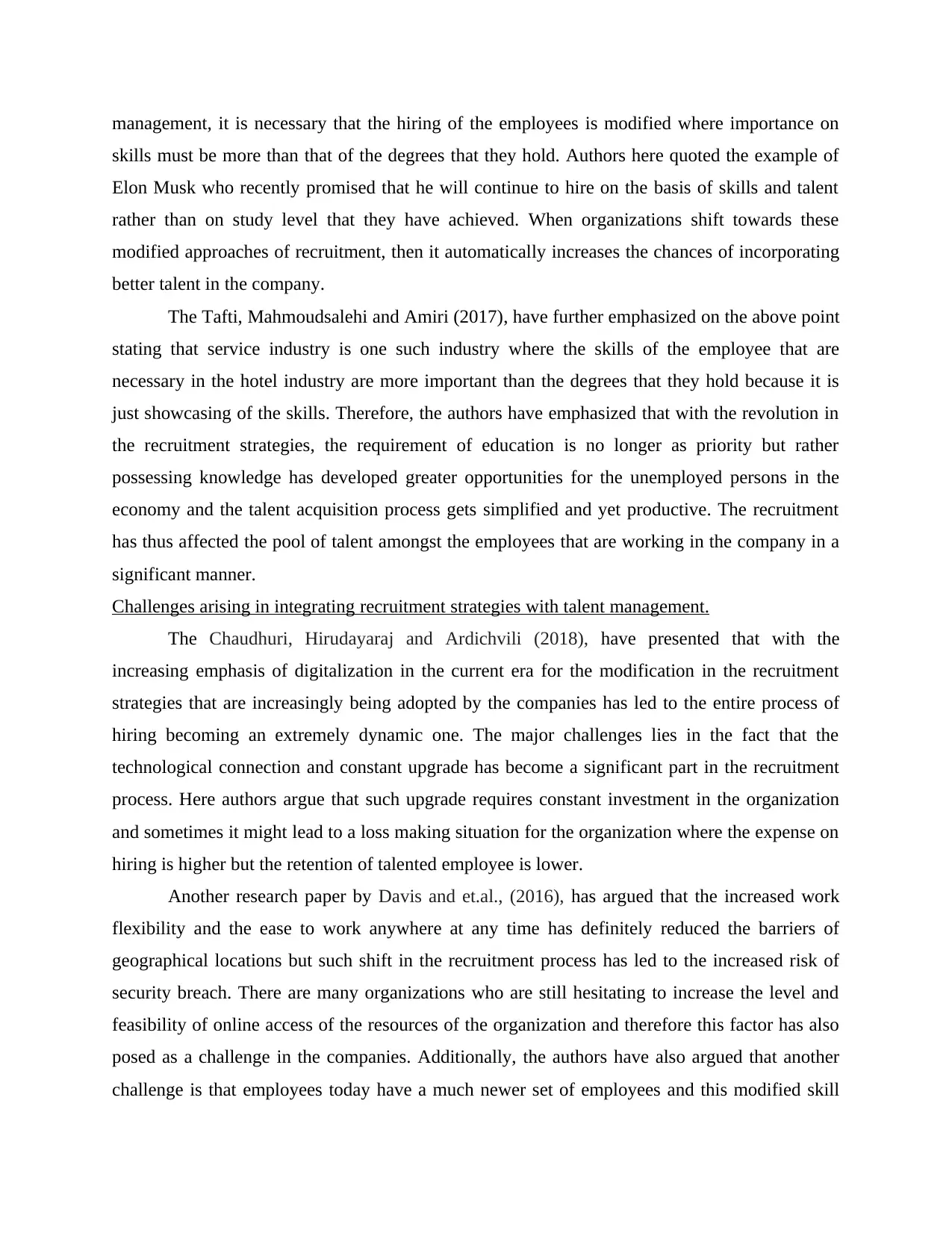
management, it is necessary that the hiring of the employees is modified where importance on
skills must be more than that of the degrees that they hold. Authors here quoted the example of
Elon Musk who recently promised that he will continue to hire on the basis of skills and talent
rather than on study level that they have achieved. When organizations shift towards these
modified approaches of recruitment, then it automatically increases the chances of incorporating
better talent in the company.
The Tafti, Mahmoudsalehi and Amiri (2017), have further emphasized on the above point
stating that service industry is one such industry where the skills of the employee that are
necessary in the hotel industry are more important than the degrees that they hold because it is
just showcasing of the skills. Therefore, the authors have emphasized that with the revolution in
the recruitment strategies, the requirement of education is no longer as priority but rather
possessing knowledge has developed greater opportunities for the unemployed persons in the
economy and the talent acquisition process gets simplified and yet productive. The recruitment
has thus affected the pool of talent amongst the employees that are working in the company in a
significant manner.
Challenges arising in integrating recruitment strategies with talent management.
The Chaudhuri, Hirudayaraj and Ardichvili (2018), have presented that with the
increasing emphasis of digitalization in the current era for the modification in the recruitment
strategies that are increasingly being adopted by the companies has led to the entire process of
hiring becoming an extremely dynamic one. The major challenges lies in the fact that the
technological connection and constant upgrade has become a significant part in the recruitment
process. Here authors argue that such upgrade requires constant investment in the organization
and sometimes it might lead to a loss making situation for the organization where the expense on
hiring is higher but the retention of talented employee is lower.
Another research paper by Davis and et.al., (2016), has argued that the increased work
flexibility and the ease to work anywhere at any time has definitely reduced the barriers of
geographical locations but such shift in the recruitment process has led to the increased risk of
security breach. There are many organizations who are still hesitating to increase the level and
feasibility of online access of the resources of the organization and therefore this factor has also
posed as a challenge in the companies. Additionally, the authors have also argued that another
challenge is that employees today have a much newer set of employees and this modified skill
skills must be more than that of the degrees that they hold. Authors here quoted the example of
Elon Musk who recently promised that he will continue to hire on the basis of skills and talent
rather than on study level that they have achieved. When organizations shift towards these
modified approaches of recruitment, then it automatically increases the chances of incorporating
better talent in the company.
The Tafti, Mahmoudsalehi and Amiri (2017), have further emphasized on the above point
stating that service industry is one such industry where the skills of the employee that are
necessary in the hotel industry are more important than the degrees that they hold because it is
just showcasing of the skills. Therefore, the authors have emphasized that with the revolution in
the recruitment strategies, the requirement of education is no longer as priority but rather
possessing knowledge has developed greater opportunities for the unemployed persons in the
economy and the talent acquisition process gets simplified and yet productive. The recruitment
has thus affected the pool of talent amongst the employees that are working in the company in a
significant manner.
Challenges arising in integrating recruitment strategies with talent management.
The Chaudhuri, Hirudayaraj and Ardichvili (2018), have presented that with the
increasing emphasis of digitalization in the current era for the modification in the recruitment
strategies that are increasingly being adopted by the companies has led to the entire process of
hiring becoming an extremely dynamic one. The major challenges lies in the fact that the
technological connection and constant upgrade has become a significant part in the recruitment
process. Here authors argue that such upgrade requires constant investment in the organization
and sometimes it might lead to a loss making situation for the organization where the expense on
hiring is higher but the retention of talented employee is lower.
Another research paper by Davis and et.al., (2016), has argued that the increased work
flexibility and the ease to work anywhere at any time has definitely reduced the barriers of
geographical locations but such shift in the recruitment process has led to the increased risk of
security breach. There are many organizations who are still hesitating to increase the level and
feasibility of online access of the resources of the organization and therefore this factor has also
posed as a challenge in the companies. Additionally, the authors have also argued that another
challenge is that employees today have a much newer set of employees and this modified skill
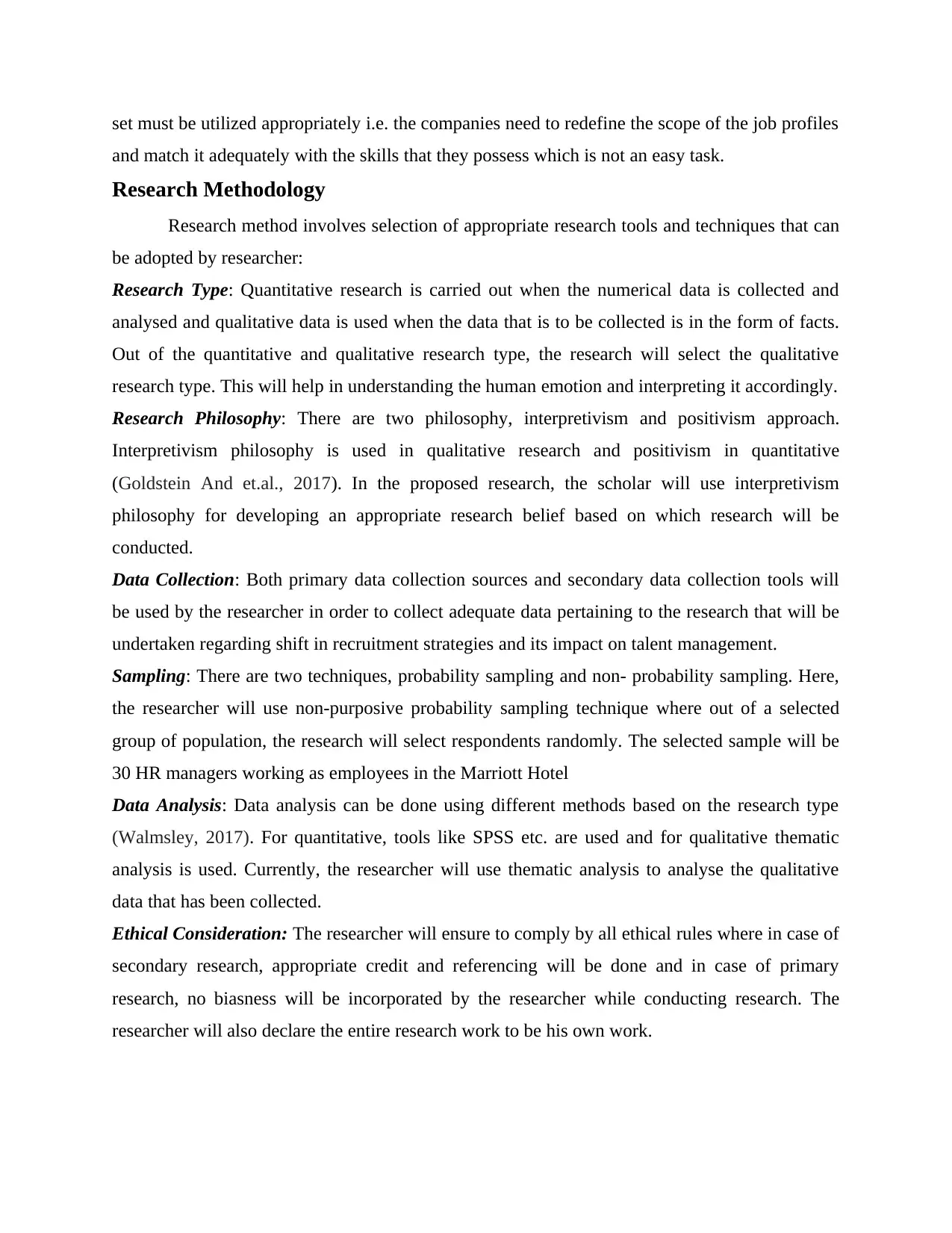
set must be utilized appropriately i.e. the companies need to redefine the scope of the job profiles
and match it adequately with the skills that they possess which is not an easy task.
Research Methodology
Research method involves selection of appropriate research tools and techniques that can
be adopted by researcher:
Research Type: Quantitative research is carried out when the numerical data is collected and
analysed and qualitative data is used when the data that is to be collected is in the form of facts.
Out of the quantitative and qualitative research type, the research will select the qualitative
research type. This will help in understanding the human emotion and interpreting it accordingly.
Research Philosophy: There are two philosophy, interpretivism and positivism approach.
Interpretivism philosophy is used in qualitative research and positivism in quantitative
(Goldstein And et.al., 2017). In the proposed research, the scholar will use interpretivism
philosophy for developing an appropriate research belief based on which research will be
conducted.
Data Collection: Both primary data collection sources and secondary data collection tools will
be used by the researcher in order to collect adequate data pertaining to the research that will be
undertaken regarding shift in recruitment strategies and its impact on talent management.
Sampling: There are two techniques, probability sampling and non- probability sampling. Here,
the researcher will use non-purposive probability sampling technique where out of a selected
group of population, the research will select respondents randomly. The selected sample will be
30 HR managers working as employees in the Marriott Hotel
Data Analysis: Data analysis can be done using different methods based on the research type
(Walmsley, 2017). For quantitative, tools like SPSS etc. are used and for qualitative thematic
analysis is used. Currently, the researcher will use thematic analysis to analyse the qualitative
data that has been collected.
Ethical Consideration: The researcher will ensure to comply by all ethical rules where in case of
secondary research, appropriate credit and referencing will be done and in case of primary
research, no biasness will be incorporated by the researcher while conducting research. The
researcher will also declare the entire research work to be his own work.
and match it adequately with the skills that they possess which is not an easy task.
Research Methodology
Research method involves selection of appropriate research tools and techniques that can
be adopted by researcher:
Research Type: Quantitative research is carried out when the numerical data is collected and
analysed and qualitative data is used when the data that is to be collected is in the form of facts.
Out of the quantitative and qualitative research type, the research will select the qualitative
research type. This will help in understanding the human emotion and interpreting it accordingly.
Research Philosophy: There are two philosophy, interpretivism and positivism approach.
Interpretivism philosophy is used in qualitative research and positivism in quantitative
(Goldstein And et.al., 2017). In the proposed research, the scholar will use interpretivism
philosophy for developing an appropriate research belief based on which research will be
conducted.
Data Collection: Both primary data collection sources and secondary data collection tools will
be used by the researcher in order to collect adequate data pertaining to the research that will be
undertaken regarding shift in recruitment strategies and its impact on talent management.
Sampling: There are two techniques, probability sampling and non- probability sampling. Here,
the researcher will use non-purposive probability sampling technique where out of a selected
group of population, the research will select respondents randomly. The selected sample will be
30 HR managers working as employees in the Marriott Hotel
Data Analysis: Data analysis can be done using different methods based on the research type
(Walmsley, 2017). For quantitative, tools like SPSS etc. are used and for qualitative thematic
analysis is used. Currently, the researcher will use thematic analysis to analyse the qualitative
data that has been collected.
Ethical Consideration: The researcher will ensure to comply by all ethical rules where in case of
secondary research, appropriate credit and referencing will be done and in case of primary
research, no biasness will be incorporated by the researcher while conducting research. The
researcher will also declare the entire research work to be his own work.
⊘ This is a preview!⊘
Do you want full access?
Subscribe today to unlock all pages.

Trusted by 1+ million students worldwide
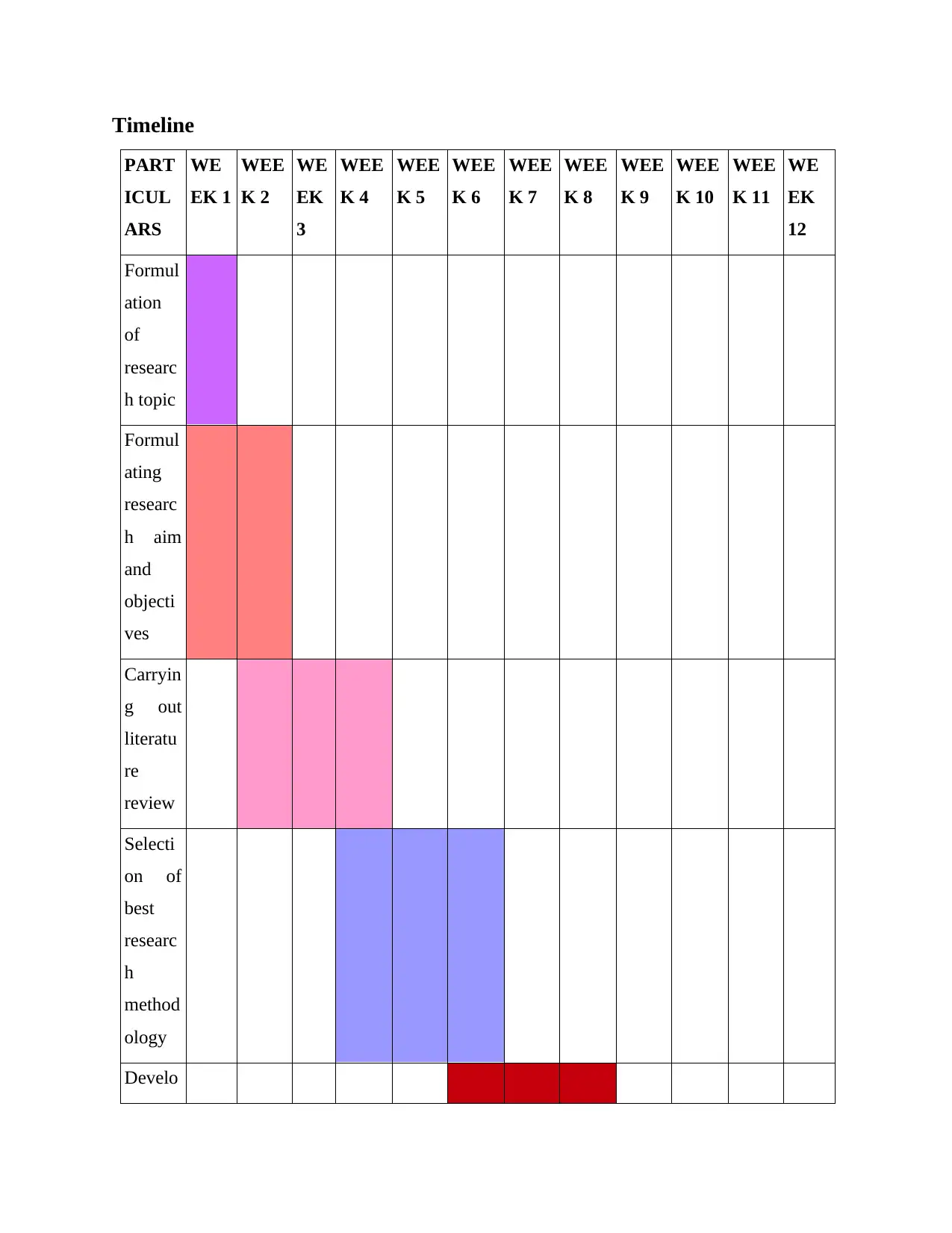
Timeline
PART
ICUL
ARS
WE
EK 1
WEE
K 2
WE
EK
3
WEE
K 4
WEE
K 5
WEE
K 6
WEE
K 7
WEE
K 8
WEE
K 9
WEE
K 10
WEE
K 11
WE
EK
12
Formul
ation
of
researc
h topic
Formul
ating
researc
h aim
and
objecti
ves
Carryin
g out
literatu
re
review
Selecti
on of
best
researc
h
method
ology
Develo
PART
ICUL
ARS
WE
EK 1
WEE
K 2
WE
EK
3
WEE
K 4
WEE
K 5
WEE
K 6
WEE
K 7
WEE
K 8
WEE
K 9
WEE
K 10
WEE
K 11
WE
EK
12
Formul
ation
of
researc
h topic
Formul
ating
researc
h aim
and
objecti
ves
Carryin
g out
literatu
re
review
Selecti
on of
best
researc
h
method
ology
Develo
Paraphrase This Document
Need a fresh take? Get an instant paraphrase of this document with our AI Paraphraser
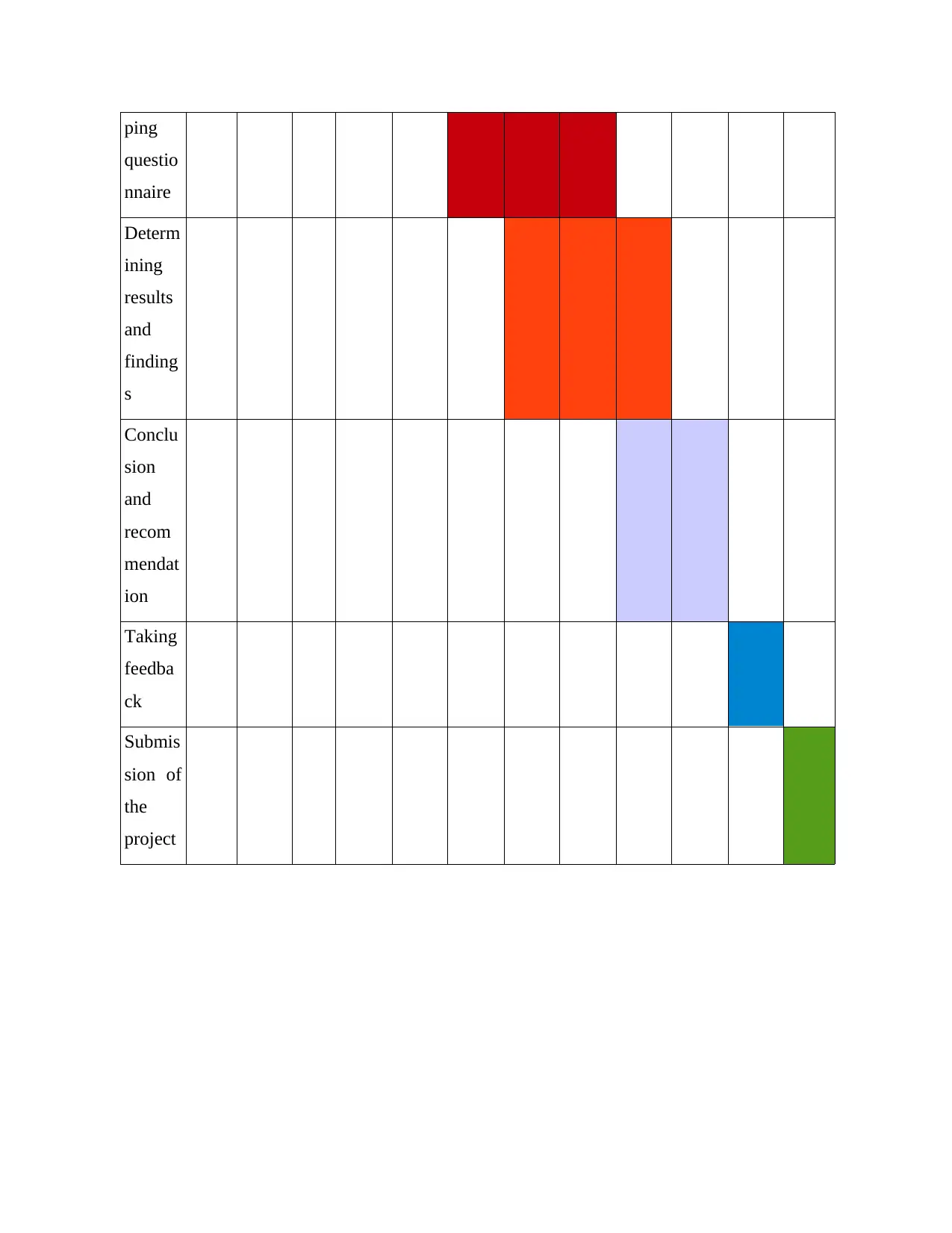
ping
questio
nnaire
Determ
ining
results
and
finding
s
Conclu
sion
and
recom
mendat
ion
Taking
feedba
ck
Submis
sion of
the
project
questio
nnaire
Determ
ining
results
and
finding
s
Conclu
sion
and
recom
mendat
ion
Taking
feedba
ck
Submis
sion of
the
project
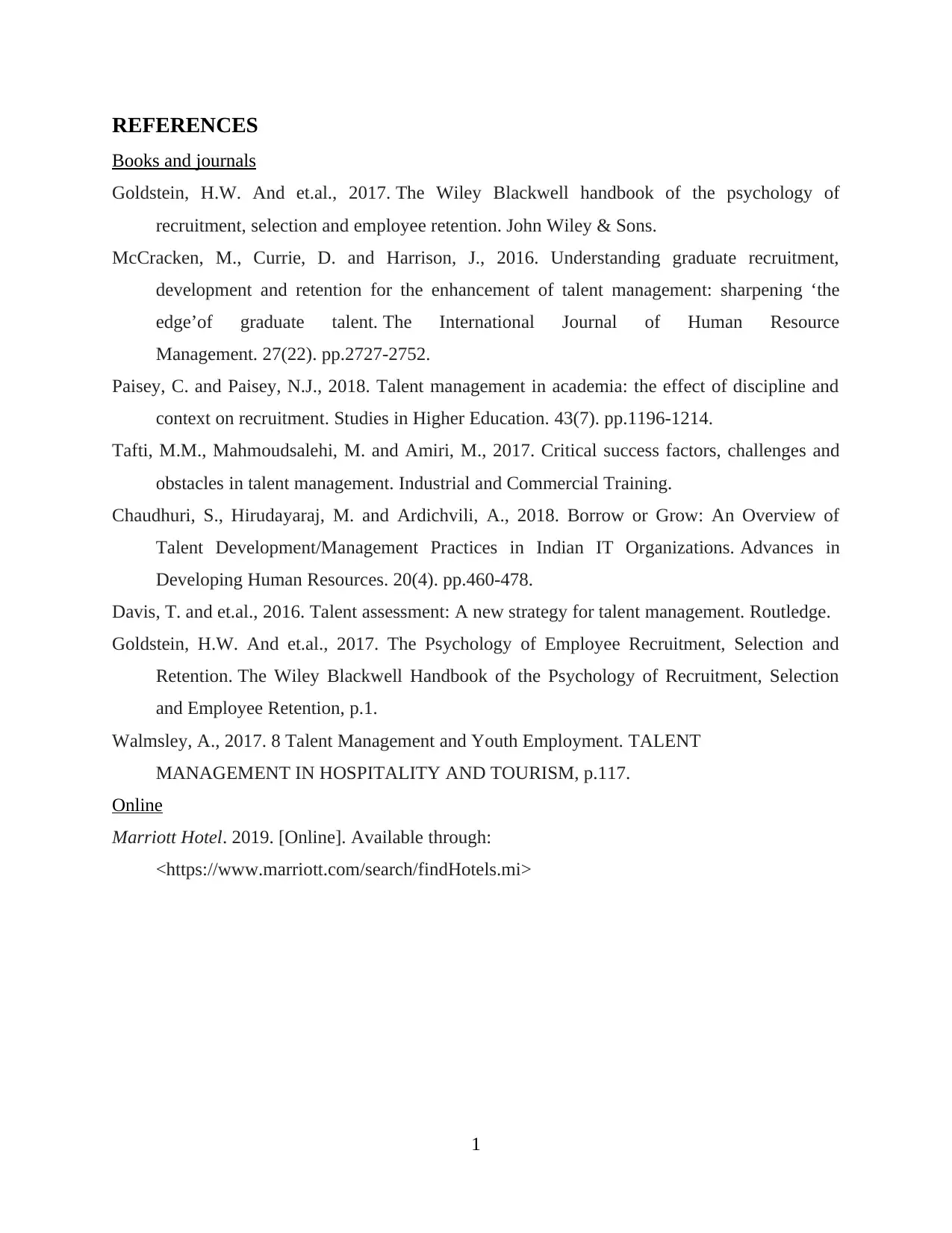
REFERENCES
Books and journals
Goldstein, H.W. And et.al., 2017. The Wiley Blackwell handbook of the psychology of
recruitment, selection and employee retention. John Wiley & Sons.
McCracken, M., Currie, D. and Harrison, J., 2016. Understanding graduate recruitment,
development and retention for the enhancement of talent management: sharpening ‘the
edge’of graduate talent. The International Journal of Human Resource
Management. 27(22). pp.2727-2752.
Paisey, C. and Paisey, N.J., 2018. Talent management in academia: the effect of discipline and
context on recruitment. Studies in Higher Education. 43(7). pp.1196-1214.
Tafti, M.M., Mahmoudsalehi, M. and Amiri, M., 2017. Critical success factors, challenges and
obstacles in talent management. Industrial and Commercial Training.
Chaudhuri, S., Hirudayaraj, M. and Ardichvili, A., 2018. Borrow or Grow: An Overview of
Talent Development/Management Practices in Indian IT Organizations. Advances in
Developing Human Resources. 20(4). pp.460-478.
Davis, T. and et.al., 2016. Talent assessment: A new strategy for talent management. Routledge.
Goldstein, H.W. And et.al., 2017. The Psychology of Employee Recruitment, Selection and
Retention. The Wiley Blackwell Handbook of the Psychology of Recruitment, Selection
and Employee Retention, p.1.
Walmsley, A., 2017. 8 Talent Management and Youth Employment. TALENT
MANAGEMENT IN HOSPITALITY AND TOURISM, p.117.
Online
Marriott Hotel. 2019. [Online]. Available through:
<https://www.marriott.com/search/findHotels.mi>
1
Books and journals
Goldstein, H.W. And et.al., 2017. The Wiley Blackwell handbook of the psychology of
recruitment, selection and employee retention. John Wiley & Sons.
McCracken, M., Currie, D. and Harrison, J., 2016. Understanding graduate recruitment,
development and retention for the enhancement of talent management: sharpening ‘the
edge’of graduate talent. The International Journal of Human Resource
Management. 27(22). pp.2727-2752.
Paisey, C. and Paisey, N.J., 2018. Talent management in academia: the effect of discipline and
context on recruitment. Studies in Higher Education. 43(7). pp.1196-1214.
Tafti, M.M., Mahmoudsalehi, M. and Amiri, M., 2017. Critical success factors, challenges and
obstacles in talent management. Industrial and Commercial Training.
Chaudhuri, S., Hirudayaraj, M. and Ardichvili, A., 2018. Borrow or Grow: An Overview of
Talent Development/Management Practices in Indian IT Organizations. Advances in
Developing Human Resources. 20(4). pp.460-478.
Davis, T. and et.al., 2016. Talent assessment: A new strategy for talent management. Routledge.
Goldstein, H.W. And et.al., 2017. The Psychology of Employee Recruitment, Selection and
Retention. The Wiley Blackwell Handbook of the Psychology of Recruitment, Selection
and Employee Retention, p.1.
Walmsley, A., 2017. 8 Talent Management and Youth Employment. TALENT
MANAGEMENT IN HOSPITALITY AND TOURISM, p.117.
Online
Marriott Hotel. 2019. [Online]. Available through:
<https://www.marriott.com/search/findHotels.mi>
1
⊘ This is a preview!⊘
Do you want full access?
Subscribe today to unlock all pages.

Trusted by 1+ million students worldwide

2
1 out of 10
Related Documents
Your All-in-One AI-Powered Toolkit for Academic Success.
+13062052269
info@desklib.com
Available 24*7 on WhatsApp / Email
![[object Object]](/_next/static/media/star-bottom.7253800d.svg)
Unlock your academic potential
Copyright © 2020–2026 A2Z Services. All Rights Reserved. Developed and managed by ZUCOL.





